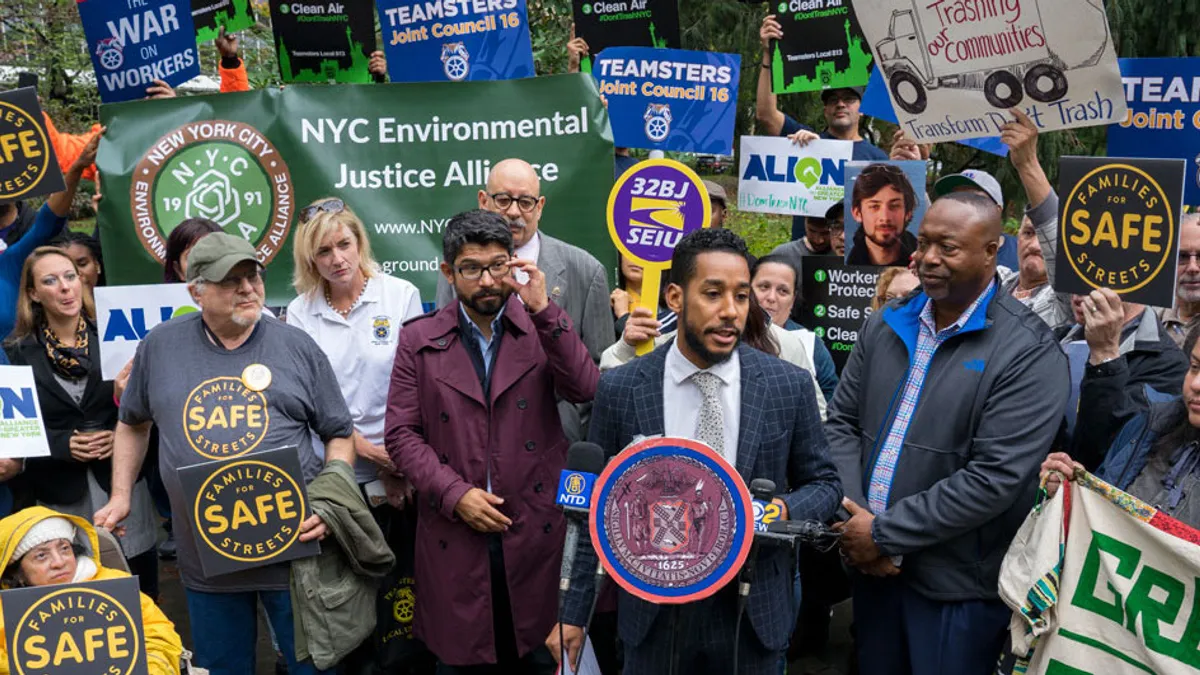Dive Brief:
- New York City Council Speaker Corey Johnson, along with five committee chairs, recently released an expansive "sustainable, circular economy" plan. One of many proposed bills would create a new plan to hit the city's goal of "zero waste" by 2030 with regular reporting requirements. Bans or extended producer responsibility (EPR) policies for certain materials could be included.
- The council could also call for the city's Department of Sanitation (DSNY) to expand curbside residential organics collection citywide and mandate participation. In a nod to local codigestion capabilities at New York's Newtown Creek wastewater treatment plant, the council will also consider mandating that biogas be used locally and an unspecified percentage of biosolids are beneficially reused.
- The council's plan includes many other material-specific proposals, including legislation to expand residential textile recycling programs and require separate textile collection for certain large commercial generators. The plan also mentions possible recycling requirements for C&D material, EPR for mattresses and potential restrictions on single-use plastic items.
Dive Insight:
New York Mayor Bill de Blasio announced the "zero waste" goal in April 2015, later calling for citywide curbside organics collection among other programs. While DSNY has worked to expand recycling programs for electronics, textiles and organics since then, many stakeholders are beginning to recognize that momentum toward the 2030 target may have stalled. DSNY's latest figures show a residential diversion rate of slightly more than 18%.
Now that New York is facing broader economic uncertainty amid the new coronavirus pandemic, it's uncertain how that will affect "zero waste" progress or the council's legislative agenda. Speaker Johnson released this plan as part of a broader climate proposal last Thursday, in lieu of a speech that was canceled due to novel coronavirus concerns.
Asked for the city's take on potential timing or collaboration on certain proposals, DSNY Director of Communications Belinda Mager told Waste Dive the agency remains "committed to sending zero waste to landfills and working with [the] Council to discuss their proposals and advance ideas." Mager also confirmed the agency does not anticipate additional funding to expand organics collection to more districts at least through the upcoming FY21 budget cycle.
Johnson's office did not provide information on potential legislative timing ahead of publication. Council Member Antonio Reynoso, who chairs the sanitation committee and signed on to the plan, could not be reached for comment.
One key question, posed by Waste Dive to both legislators, is why this new plan includes no mention of a pay-as-you-throw or "save-as-you-throw" model. Other major cities have paired similar policies with the shift to mandatory organics diversion and it has been a particular priority for Reynoso in recent years. DSNY even awarded a $1 million contract to consulting firm Resource Recycling Systems to study implementation of the concept in 2018, but the work was never started after Johnson made skeptical public comments.
Norman Steisel, a consultant who previously served as deputy mayor and DSNY commissioner, told Waste Dive he believes the question at hand is larger than any policy to encourage behavioral change. In his view, making something mandatory is the easy part (curbside recycling still has partial participation after being mandatory for decades) but planning for the full scope of logistical and infrastructure factors involved is what's necessary.
"It’s a very modest step forward into the unknown," said Steisel. “I think their legislative intent, which on the surface looks appealing, is going to fall far short of what needs to be done.”
Citing research by the Citizens Budget Commission, Steisel mentioned that in-sink devices could be a more viable solution for certain building types as one example of thinking beyond a citywide curbside collection mandate. He also raised the need for council members to take a more active role in working to site processing infrastructure within the city, rather than relying on external infrastructure, and to consider the role of biogas in heating buildings or being converted into fuel for city vehicles.
As to how all of this could be affected by the pandemic response, Steisel said that remains an "open question." New York and the world at large will be grappling with these economic factors in the months to come, making the prospects of any major capital spending for initiatives such as organics less certain, but some elements of the council's agenda may prove a lighter lift.
Among the 20-plus proposals, which hint at more than a dozen pieces of potential legislation, the council could still pursue some less expensive items. Examples include proposed studies on bioplastics management, the viability of a trash wheel to capture marine debris similar to what Baltimore has done and the possibility of a "conscious consumerism campaign."
Another proposed item that could be unaffected, assuming the city's plans for a new commercial waste zone system proceed on schedule, is a study on commercial recyclables in partnership with the Natural Resources Defense Council. Senior Attorney Eric Goldstein confirmed to Waste Dive this idea is still in the early stages, but could involve working with city officials and a local university to obtain and analyze data from zone contractors to better measure recycling rates. Focusing on the commercial waste sector will be a major component of New York's push toward the 2030 "zero waste" target, and current data on diversion rates is less reliable than the residential sector.












